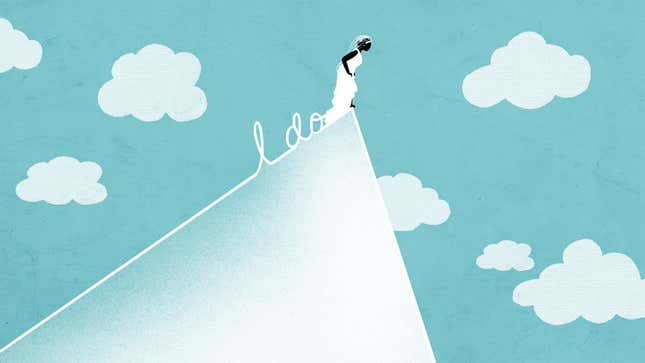When Brides Get the Post-Wedding Blues
In Depth

As if you needed more incentive to have a low-key wedding versus going on the fritz to art-direct the Best Day of Your Life ™, here you go: Brides who view their wedding as the end-all be-all of milestones are often super bummed when the giddiness of the champagne and shrimp puffs wears off.
In a piece at Daily Life, Kasey Edwards asks why so many brides get the post-wedding blues. She references a very very small study that is so small we cannot call it compelling — only 28 freshly hitched ladies were interviewed — but also digs into the lore of online forums and other reporting on the issue. Edwards writes:
I’d always thought that marital discord built up over years, but new research shows that things start turning sour soon after the bride tosses her bouquet.
A paper published last week in the Journal of Family Issues found that just shy of fifty per cent of brides suffer from postnuptial blues. This can range from temporary sadness and discontent to full-blown depression.
Half is a lot. But when you look at the mania surrounding weddings, it’s not hard to see that after all the soul-grinding minutia of the planning, and the soul-killing stress of the dieting — to say nothing about the anxiety over guest lists, etiquette, and other assorted mayhem covered in great depth here — I am frankly shocked that figure is not closer to 85 percent. I mean, having to even think about what it would take to plan a super small wedding is why I eloped.
According to Edwards, the researchers found these differences in the feelings of blue brides versus happy brides after the wedding mania died down:
- Blue Bride: Uncertain if she’d picked the right dude
- Happy Bride: Felt super happy post-wedding because a sense of security and commitment kicked in
Edwards writes:
As one [blue] bride told the researchers, ‘[T]hings…pop up where you think, “I kind of wish I had known that prior to committing to this person. Not because I would have chosen not to commit to them, but just because I would have had a more complete picture of what I was signing up for”‘.
- Blue Bride: Held the view that the wedding was “all about her” and “fulfilling her childhood fantasy”
- Happy Bride: Thought the wedding was as much about the her family and the groom and his family as well
Edwards:
-

-

-

-

-

-

-

-

-

-

-

-

-

-

-

-

-

-

-

-

-

-

-

-

-

-

-

-

-

-

-

-

-

-

-

-

-

-

-

-








































